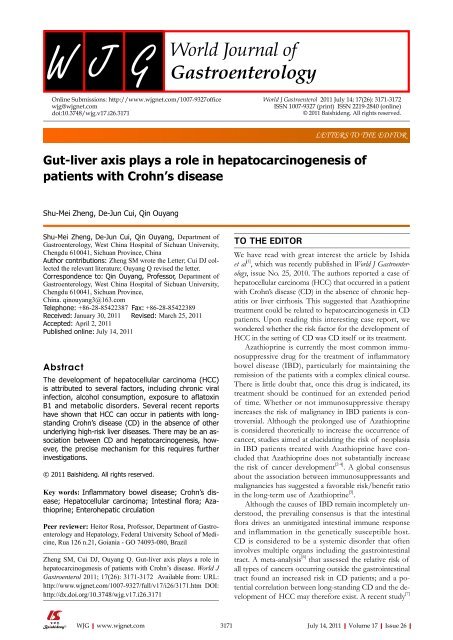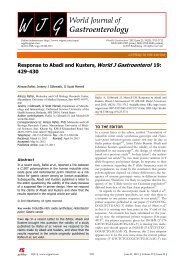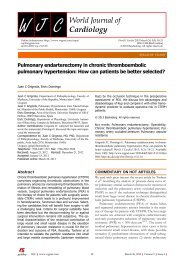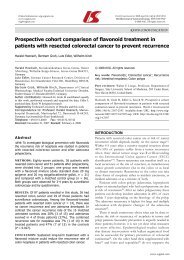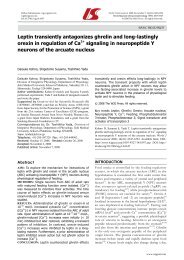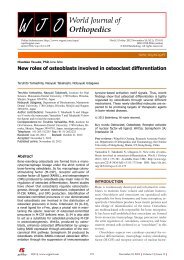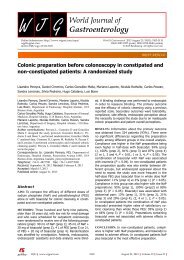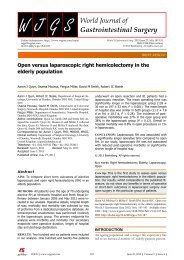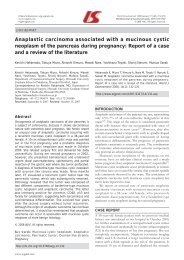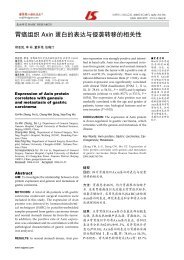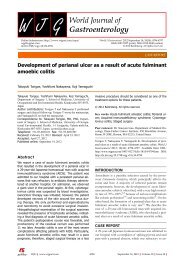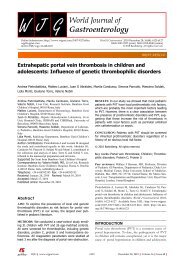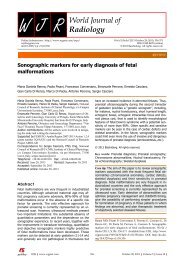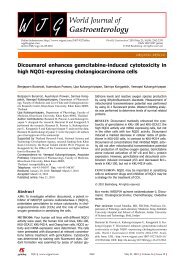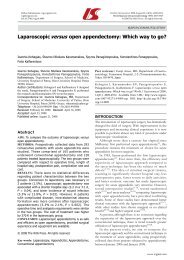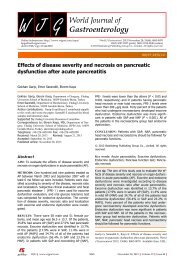26 - World Journal of Gastroenterology
26 - World Journal of Gastroenterology
26 - World Journal of Gastroenterology
Create successful ePaper yourself
Turn your PDF publications into a flip-book with our unique Google optimized e-Paper software.
Online Submissions: http://www.wjgnet.com/1007-9327<strong>of</strong>fice<br />
wjg@wjgnet.com<br />
doi:10.3748/wjg.v17.i<strong>26</strong>.3171<br />
LETTERS TO THE EDITOR<br />
Gut-liver axis plays a role in hepatocarcinogenesis <strong>of</strong><br />
patients with Crohn’s disease<br />
Shu-Mei Zheng, De-Jun Cui, Qin Ouyang<br />
Shu-Mei Zheng, De-Jun Cui, Qin Ouyang, Department <strong>of</strong><br />
<strong>Gastroenterology</strong>, West China Hospital <strong>of</strong> Sichuan University,<br />
Chengdu 610041, Sichuan Province, China<br />
Author contributions: Zheng SM wrote the Letter; Cui DJ collected<br />
the relevant literature; Ouyang Q revised the letter.<br />
Correspondence to: Qin Ouyang, Pr<strong>of</strong>essor, Department <strong>of</strong><br />
<strong>Gastroenterology</strong>, West China Hospital <strong>of</strong> Sichuan University,<br />
Chengdu 610041, Sichuan Province,<br />
China. qinouyang3@163.com<br />
Telephone: +86-28-85422387 Fax: +86-28-85422389<br />
Received: January 30, 2011 Revised: March 25, 2011<br />
Accepted: April 2, 2011<br />
Published online: July 14, 2011<br />
Abstract<br />
The development <strong>of</strong> hepatocellular carcinoma (HCC)<br />
is attributed to several factors, including chronic viral<br />
infection, alcohol consumption, exposure to aflatoxin<br />
B1 and metabolic disorders. Several recent reports<br />
have shown that HCC can occur in patients with longstanding<br />
Crohn’s disease (CD) in the absence <strong>of</strong> other<br />
underlying high-risk liver diseases. There may be an association<br />
between CD and hepatocarcinogenesis, however,<br />
the precise mechanism for this requires further<br />
investigations.<br />
© 2011 Baishideng. All rights reserved.<br />
Key words: Inflammatory bowel disease; Crohn’s disease;<br />
Hepatocellular carcinoma; Intestinal flora; Azathioprine;<br />
Enterohepatic circulation<br />
Peer reviewer: Heitor Rosa, Pr<strong>of</strong>essor, Department <strong>of</strong> <strong>Gastroenterology</strong><br />
and Hepatology, Federal University School <strong>of</strong> Medicine,<br />
Rua 1<strong>26</strong> n.21, Goiania - GO 74093-080, Brazil<br />
Zheng SM, Cui DJ, Ouyang Q. Gut-liver axis plays a role in<br />
hepatocarcinogenesis <strong>of</strong> patients with Crohn’s disease. <strong>World</strong> J<br />
Gastroenterol 2011; 17(<strong>26</strong>): 3171-3172 Available from: URL:<br />
http://www.wjgnet.com/1007-9327/full/v17/i<strong>26</strong>/3171.htm DOI:<br />
http://dx.doi.org/10.3748/wjg.v17.i<strong>26</strong>.3171<br />
WJG|www.wjgnet.com<br />
3171<br />
<strong>World</strong> J Gastroenterol 2011 July 14; 17(<strong>26</strong>): 3171-3172<br />
ISSN 1007-9327 (print) ISSN 2219-2840 (online)<br />
© 2011 Baishideng. All rights reserved.<br />
TO THE EDITOR<br />
We have read with great interest the article by Ishida<br />
et al [1] , which was recently published in <strong>World</strong> J <strong>Gastroenterology</strong>,<br />
issue No. 25, 2010. The authors reported a case <strong>of</strong><br />
hepatocellular carcinoma (HCC) that occurred in a patient<br />
with Crohn’s disease (CD) in the absence <strong>of</strong> chronic hepatitis<br />
or liver cirrhosis. This suggested that Azathioprine<br />
treatment could be related to hepatocarcinogenesis in CD<br />
patients. Upon reading this interesting case report, we<br />
wondered whether the risk factor for the development <strong>of</strong><br />
HCC in the setting <strong>of</strong> CD was CD itself or its treatment.<br />
Azathioprine is currently the most common immunosuppressive<br />
drug for the treatment <strong>of</strong> inflammatory<br />
bowel disease (IBD), particularly for maintaining the<br />
remission <strong>of</strong> the patients with a complex clinical course.<br />
There is little doubt that, once this drug is indicated, its<br />
treatment should be continued for an extended period<br />
<strong>of</strong> time. Whether or not immunosuppressive therapy<br />
increases the risk <strong>of</strong> malignancy in IBD patients is controversial.<br />
Although the prolonged use <strong>of</strong> Azathioprine<br />
is considered theoretically to increase the occurrence <strong>of</strong><br />
cancer, studies aimed at elucidating the risk <strong>of</strong> neoplasia<br />
in IBD patients treated with Azathioprine have concluded<br />
that Azathioprine does not substantially increase<br />
the risk <strong>of</strong> cancer development [2-4] . A global consensus<br />
about the association between immunosuppressants and<br />
malignancies has suggested a favorable risk/benefit ratio<br />
in the long-term use <strong>of</strong> Azathioprine [5] .<br />
Although the causes <strong>of</strong> IBD remain incompletely understood,<br />
the prevailing consensus is that the intestinal<br />
flora drives an unmitigated intestinal immune response<br />
and inflammation in the genetically susceptible host.<br />
CD is considered to be a systemic disorder that <strong>of</strong>ten<br />
involves multiple organs including the gastrointestinal<br />
tract. A meta-analysis [6] that assessed the relative risk <strong>of</strong><br />
all types <strong>of</strong> cancers occurring outside the gastrointestinal<br />
tract found an increased risk in CD patients; and a potential<br />
correlation between long-standing CD and the development<br />
<strong>of</strong> HCC may therefore exist. A recent study [7]<br />
July 14, 2011|Volume 17|Issue <strong>26</strong>|


